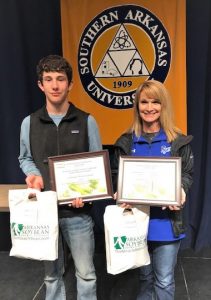Rayne Cranford – 2019 Arkansas Soybean Science Challenge Award Winner Southwest Arkansas Regional Science Fair

Rayne Cranford, age 15, a freshman at Taylor High School in Taylor, won the Soybean Science Challenge at the 2019 Southwest Arkansas Regional Science Fair at Southern Arkansas University-Magnolia on March 8.
Rayne Cranford, Taylor High School, Taylor
Teacher: Christy Hoyle
Category: Biological Sciences
Project Title: Soybean seed bacterial inoculation
Abstract:
Purpose: Over 100 million metric tons of nitrogen fertilizer is used each year by farmers, with only about half of the fertilizer applied to field being used by the target crop, leaving the rest left to be lost to the environment. Soybeans have the ability to fix nitrogen from the atmosphere with the help of nitrogen fixing bacteria rhizobium. Nitrogen fixation is vital for soybeans to grow and gives the agricultural industry enormous potential to produce higher yielding soybean crops at a lower cost to farmers, while dramatically reducing the effects of nitrogen fertilizers on the environment. The idea was to determine if inoculating seeds with rhizobia will supply the soil with an adequate level of nitrogen, when compared to fertilizer, to support plant growth.
Procedure: Soybean seeds coated with rhizobium and untreated soybean seeds were planted into separate pots with no fertilizer added to the soil. Untreated soybean seeds were planted into pots with fertilizer added to the soil. Analysis of nitrogen levels by soil test were taken for a five-week period and the germination emergence was observed and recorded.
Data: the final analyzed results of the testing showed an average nitrogen level for the control group at 3.8 ppm, an average nitrogen level for the fertilized soil at 29.3 ppm, and an average nitrogen level for the rhizobium inoculated soil at 15.3 ppm. The soybean inoculated seeds all germinated and the cotyledons emerged from the soil on days 5-7 after planting. The seeds planted in fertilized soil all germinated and had a 6-8 days’ emergence. The control group had 5 seeds not germinated and the remaining cotyledons started emerging on days 7-10.
Conclusion: The results of the study supports the original hypothesis and the research of others on the topic, rhizobia inoculated soybean seeds can produce a moderate level of nitrogen which is enough to support plant growth when compared to high levels of nitrogen fertilizers. Nitrogen fixation using rhizobia inoculation provides substantial economic benefits to farmers as the price of fertilizers continues to rise. Further research is needed to fully understand the dynamics of nitrogen in agroecosystems to better help farmers increase their agricultural sustainability while reducing its impact on the environment.
Rayne Cranford wins 2019 Arkansas Soybean Science Challenge Award at Southwest Arkansas Regional Science Fair
Rayne Cranford, age 15, a freshman at Taylor High School in Taylor, won the Soybean Science Challenge at the 2019 Southwest Arkansas Regional Science Fair held at Southern Arkansas University-Magnolia March 8.
Cranford received a $300 cash award provided by the Arkansas Soybean Promotion Board at the awards ceremony. His science project titled “Soybean seed bacterial inoculation” also received first place in Biological Sciences and third place overall Best of Fair.
Cranford will compete at the Arkansas State FFA Agriscience Fair in Hot Springs, April 23. Christy Hoyle, Cranford’s teacher, won the $200 Soybean Science Challenge Teacher Mentor Award. Hoyle believes the Soybean Science Challenge is a great educational opportunity for students. “I encourage any with an interest in plant science to participate in The Challenge as they gain a great deal of knowledge about the importance of soybeans in Arkansas,” she said.
Cranford says it was an honor to win the 2019 Soybean Science Challenge. “There were so many really great projects at regional this year, I feel honored my project was chosen,” he said.
Doug and Shana Cranford, Rayne’s parents, were excited and proud of his award. His parents said that Rayne eagerly awaits the time when the science fair projects start. “He looks forward to them every year and has usually researched the information on the next year’s project before the start of the school year. He loves learning about agriculture and has shown an interest in projects related to the agricultural industry for the past several years. He really enjoyed doing this project and learning about the soybean industry,” they replied.
Hoyle believes Cranford is the perfect student for the Soybean Science Challenge. “Rayne is an outstanding student who puts a great deal of effort into his studies and projects outside of school,” she said.
Cranford admitted he had limited knowledge about soybeans before taking the Soybean Science Challenge online course. “I knew very little about soybeans; we know a few local farmers that grow soybean crops and I really didn’t understand until now why they worried over cost, the weather or their soybean yield,” he noted.
The part of the Soybean Science Challenge course that appealed the most to Cranford was learning that Arkansas plays such a critical role in soybean production and that animal agriculture is the number one customer for USA soy products. “The projected increase of 70-100% in world food demand by the year 2050 really caught my attention. Learning that soy-based ingredients are such a key factor in addressing hunger issues both here and internationally is one of the reasons more research is needed to improve soybean yields at lower costs to farmers,” he stated.
“The Soybean Science Challenge provides an opportunity for Arkansas High School students to participate in scientific research that can impact the State of Arkansas as well as the world. Soybean Science Challenge student researchers learn about this important commodity crop and its many uses including feeding the world, development of biofuels and sustainable products. The Soybean Science Challenge helps students develop an understanding of the challenges and complexities of modern farming,” said Dr. Julie Robinson, Assistant Professor and director of the program.
“The goal of the Arkansas Soybean Science Challenge is to engage students in “real world” education to support soybean production and agricultural sustainability,’” said Gary Sitzer, a member of the Arkansas Soybean Promotion Board. “The program also rewards scientific inquiry and discovery that supports the Arkansas Soybean Industry.”
The Arkansas Soybean Science Challenge was launched in January 2014 to 9-12th grade science students. Students who successfully completed the online course were eligible to have their original soybean-related research projects judged at the 2019 ISEF-affiliated Arkansas Science and Engineering Fairs.
Information on the 2019-2020 Arkansas Soybean Science Challenge will be available in summer 2019. For more information, contact Dr. Julie Robinson at jrobinson@uaex.edu or Diedre Young at dyoung@uaex.edu.
The Cooperative Extension Service is part of the University of Arkansas System Division of Agriculture.
